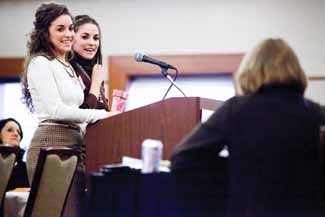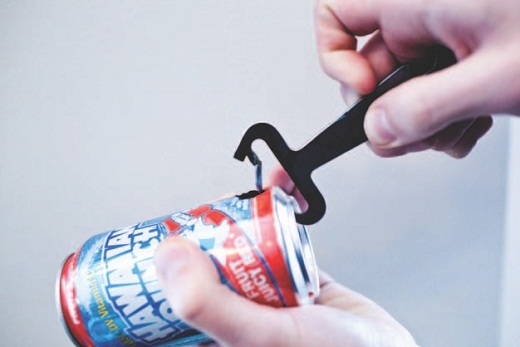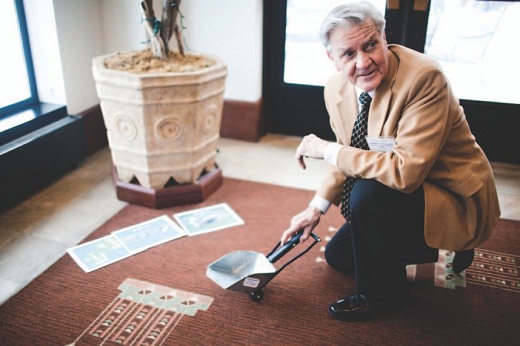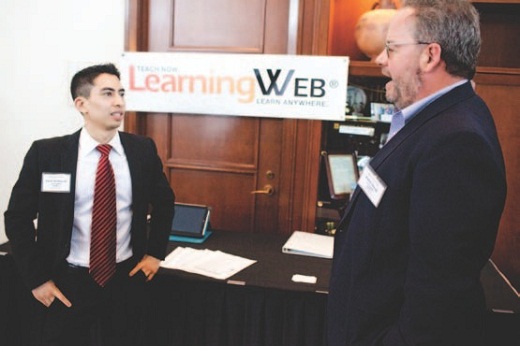Mid-Mo Entrepreneurial Summit
Economic developers use competition to spark startups
Photos by August Kryger
Bailye and Brynne Stansberry were disheartened that their business plan failed to make the cut for the Boone County Idea Bounce Competition, the final event of the Mid-Mo Entrepreneurial Summit.

But the twins, business marketing majors at Columbia College, decided to go ahead and attend the Feb. 4 event, do some networking and glean information from sessions such as “Angel and Venture Capital Funding: How to Go After It” and “Entrepreneurial War Stories,” featuring owners of fast-growing local businesses.
They also happened to be sitting in the audience at the Reynolds Alumni Center when Kenneth Harrington, managing director of the Skandalaris Center for Entrepreneurial Studies, cut short his presentation and asked if anyone wanted to stand up and make an on-the-spot, 90-second pitch for a business plan.
Brynne said Sean Siebert, their adviser and business teacher at Columbia College, leaned over and asked, “Twins, are you feeling brave?”
“My immediate response was, ‘No,’’’ she recalled. “But we thought, yeah, we know our product and believe in it. I stood up, and Bailye joined me.”
They were a hit. “About 15 people came up to us afterward and started asking questions,” Bailye said. When they were leaving during the lunch break to walk and feed their dog, Siebert suggested they bring the prototype boot from home to the afternoon sessions to show people what they were talking about.
While they were gone, conference organizers decided to invite the Stansberrys to take the place of an Idea Bounce contestant who dropped out of the competition.
They had about 90 minutes to prepare, though the 15 competing teams had weeks to get ready, Bailye pointed out. They also were the only female presenters in the competition.
The pitches proceed
The panel of judges was a savvy and sometimes skeptical fivesome: Gregory Bier, a management professor in the MU College of Business; Jake Halliday, director of the Missouri Innovation Center and the MU Life Sciences Business Incubator; Keith Pollitte, manager of information technology at the Reynolds Journalism Institute; Brent Beshore, owner of Pure and a handful of spinoff companies; and Shelly Simon, co-founder of a longstanding architectural firm.

All of them were confident, but few matched the moxie of Nicholas Kampe, the youngster trying to launch Listener Approved LLC. The website and mobile application are designed to promote independent musicians by providing a venue where they “can be discovered by listeners around the world.” His proprietary technology, Kampe said, is unique in the market and will “help pioneer the free-music revolution.”
The company, comprised of three officers, three division directors and an intern, already has secured $40,000 in financing. With just $1 million, he said, ListenerApproved.com could hit the virtual world running and make a profit within two years.
Under questioning, Kampe acknowledged that his patent is pending, and he has yet to resolve all of the copyright questions.
Another student, Justin Wenk, pitched the idea of a fiber-optic plume that could replace the feathers in the caps of marching band musicians and create a light show of sorts. The electronic plume would emit flashing light and be programmed to match the music, which would give the bands “a competitive edge.”

Scientists join the fray
Several pitch teams were led by scientists, including a few veteran entrepreneurs, explaining highly sophisticated concepts.
Sagar Gupta’s venture, Verapulse, is a technique for detecting cancer cells in the blood stream at an early stage of development, particularly melanoma.
Gupta seemed to be at a disadvantage trying to explain, in just three minutes, a photo-acoustic detection technique in which “processed blood is pumped along with air with the help of two different syringe pumps onto a piezoelectric clip transducer, which is placed under the influence of a pulsed laser.” The judges were left to their imaginations, though the printed entry included a four-color schematic diagram.
Rebecca Rone, the chief scientific officer for EternoGen, is a visiting MU scientist with a track record of promising inventions and highly credentialed colleagues. Their medical device startup company was described as “an innovative, proprietary, nanotechnology-based collagen scaffold matrix that will transform regenerative medicine.”
The picture got a bit clearer when CEO Louis Jimenez told the judges that the first target customers for their product, Dermelle, would be reconstructive and cosmetic surgeons who use “facial dermal fillers” on scars and wrinkles. EternoGen is offering a 43 percent ownership stake for $1.6 million, a proven business model and a return of 60 times the investment amount in seven years.
This first-year event, hosted by Regional Economic Development Inc. and sponsored by the MU College of Business, was a warm-up event for EternoGen; the company was selected to give an eight-minute presentation at the Nanotechnology & Sustainability Venture Forum at Rice University later in the month.
But EternoGen didn’t even make it to the winners’ circle.

NanoDiagnostics won third place for a “dipstick assay,” similar to a pregnancy testing stick, that detects problematic reactions to drugs used to treat AIDS patients. Co-founder Khalid Alam told the judges that the device would be affordable and had the potential to “improve millions of lives and save billions of dollars.”
The second-place prize, $350, went to Polarbac LLC, another business developing a disposable medical instrument, one designed to quickly detect sepsis, or blood poisoning.
The Stansberry twins appeared to be novices in this crowd. But they actually had made their pitch before, in marketing competitions during high school in Moberly.
They also received encouragement from another pair of entrepreneurs; their father and uncle, Doug and Ed Stansberry, founded Premier Paper and Packaging in 1994 and moved the growing operation from Moberly to Columbia in 2008.
Still, Bailye said when they were announced as winners of the $1,000 first prize donated by VA Mortgage Center.com, “We were shocked.”
They also know they have a long way to go before their boots make it to the market, and Brynne said the prize money will stay in the bank “while we figure out our next step.”


